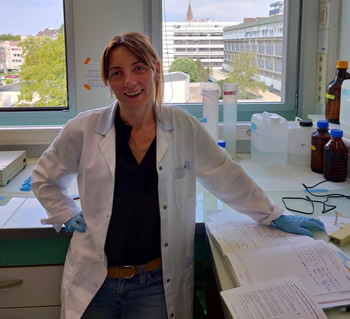Dr. Angelita SimonettiBy Dr. Prakash Kharel  Dr. Angelita Simonetti is an INSERM research scientist in the “Structure & Dynamics of Molecular Biomachines” group, headed by Dr. E. Ennifar at the IBMC (Institute of Molecular and Cell Biology, University of Strasbourg, France). As an expert in structural and molecular biology of the translation apparatus, Dr. Simonetti’s scientific work has focused on translation initiation processes in bacteria and recently in eukaryotes. Her results have marked major steps forward in the understanding of the mechanism of translation initiation in various organisms. Dr. Simonetti is originally from Italy, where her scientific journey started during her MS research with Prof. Claudio Gualerzi at the University of Camerino. Immediately after her MS, she received a fellowship for a proficiency course in protein crystallography in the laboratory of Dr. Marat Yusupov (IGBMC, Strasbourg, France). Nine months later, at the end of her fellowship, Dr. Simonetti was offered a Ph.D. position in the same lab under the co-supervision of Prof. Gualerzi and in collaboration with Dr. Bruno Klaholz (IGBMC, Strasbourg, France), who has introduced her in the cryo-electron microscopy (Cryo-EM) field. During her PhD and her first postdoc, she collaborated with the Steiz Lab (Yale University) and Puglisi Lab (Stanford University) and successfully established a detailed structure of the bacterial translation initiation factor 2 (IF2) and characterized its interaction with the 30S ribosome, and notably its global conformational changes driven by GTP hydrolysis upon ribosomal subunit joining. After she has addressed the role of IF2 on the 30S and 70S IC assembly, she felt that her contribution to the comprehension of bacteria initiation process was complete and her interest moved towards an even more challenging project: translation initiation in eukaryotes. For this reason, she has joined the team of Dr. Eriani (IBMC, Strasbourg, France) and then the team of Dr. Hashem (IBMC, Strasbourg, France) to study at high resolution the canonical cap-dependent mode and the unusual but highly efficient Translation Initiation pathway used by the histone H4 mRNA. Since her recruitment in 2016 as an INSERM tenured Research Scientist, she is focusing her research on the link between eukaryotic translation initiation deregulation and cancer development and progression.
Dr. Simonetti is grateful to her mentors who have instilled a great passion for science, passion which still guides her research every day, and the role each has played in shaping her scientific career. In addition to many great collaborators and tutors in her scientific journey, two directors of the CNRS research unit at IBMC, namely Prof. Eric Westhof and Prof. Pascale Romby, have supported her scientific career in several aspects and to which she is infinitely grateful. She also feels fortunate to have her husband Dr. Stefano Marzi by her side, who introduced her the fascinating world of translation! The fruitful synergies with several members of the different laboratories have allowed her to obtain additional skills and results that have marked crucial steps in her career. When asked about the challenges in her learning phase, she said, “I have to admit that one unexpected difficulty I have encountered was to obtain credibility. Our small scientific world has special unwritten rules, and science is not only research and discoveries. It is a world of humans with different sensibilities and cultures, which also requires interpersonal skills. These are probably the most difficult skills to learn for me, sometimes creating problems due to a misunderstanding of my highly passionate behavior.” She has participated in numerous international meetings including the RNA Society Annual Meetings. She feels that “meeting researchers from all over the world gives us the double advantage of sharing scientific results and knowing how research is organized in other countries.” One memory that stands out for her was from the keynote lecture from Dr. Robert Schneider (NYU Cancer Institute) at the RNA 2014 meeting in Quebec, Canada. She was particularly fascinated by his suggestion of developing cancer therapies that could target the translation regulation signals present on individual mRNAs of oncogenes. Dr. Simonetti suggests the newcomers in the field should let their curiosity and scientific rigor guide their research. She added, “For a young researcher, the PhD is the most exciting, but sometimes the most difficult period. Don’t give up on difficulties but rather increase your efforts, even when you are the only one who believes you can succeed!” Dr. Simonetti’s favorite RNA is the one, which can always find a way to be translated even under non-optimal harsh environments. You can follow her on ResearchGate @ https://www.researchgate.net/profile/Angelita_Simonetti2. |
